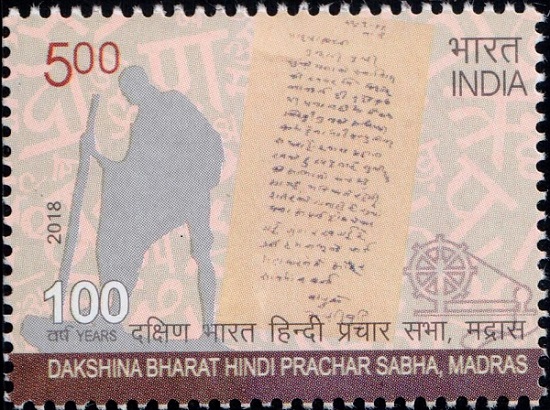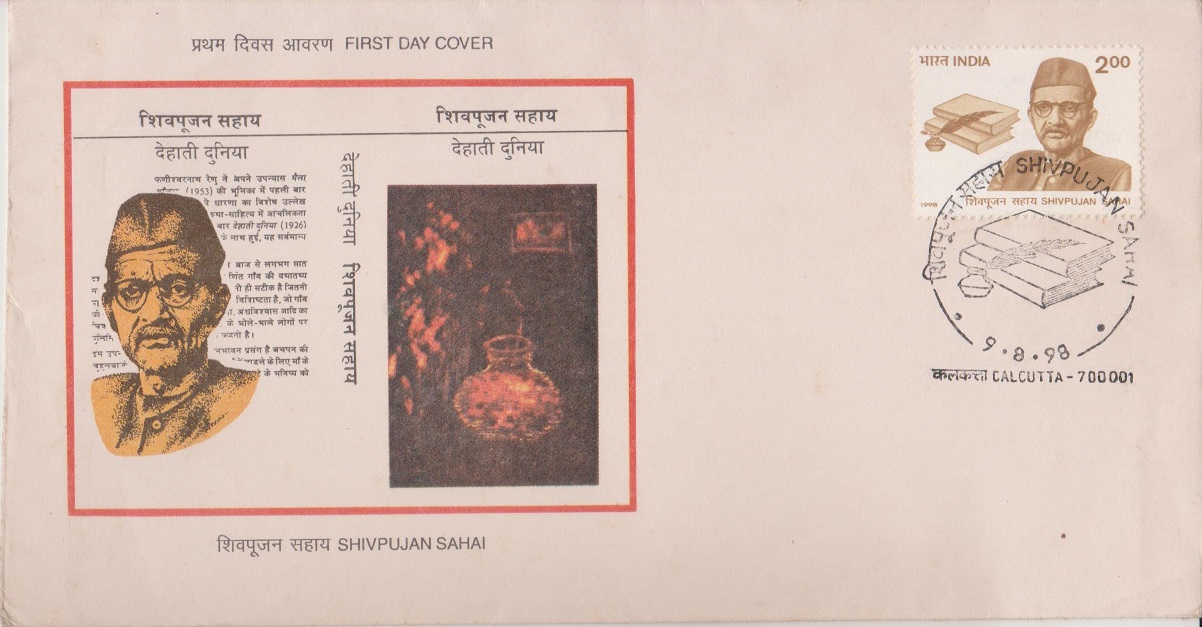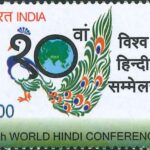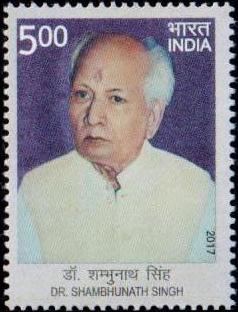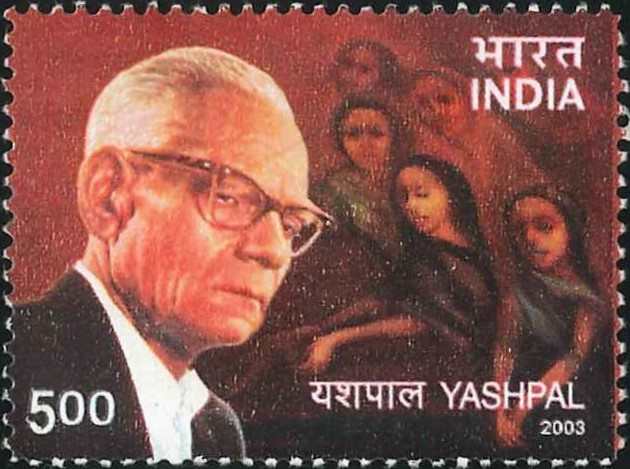
Yashpal
A commemorative postage stamp on the Birth Centenary of Yashpal, a Hindi author and campaigner of women’s rights :

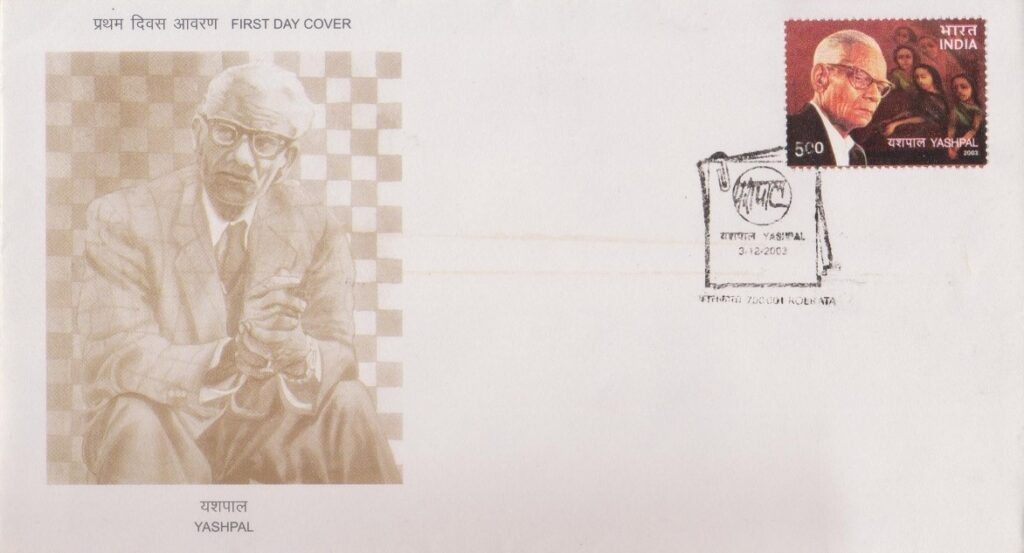
 Issued by India
Issued by India
Issued on Dec 3, 2003
Issued for : The Department of Posts is proud to commemorate his birth centenary through the issue of this stamp that depicts the writer in a pensive mood and highlights his concern for gender issues.
Credits :
Stamp : Based on a painting by Gogi Saroj Pal received from the proponent.
FDC : Binoy Varghese
Cancellation : Alka Sharma
Type : Stamp, Mint Condition
Colour : Four Colour
Denomination : 500 Paise
Overall size : 2.90 x 3.91 Cms.
Printing size : 2.55 x 3.56 Cms.
Perforation : 13 x 13
Paper : Imported un w/m Adhesive Gravure Coated stamp paper in Sheets 50.8 x 53.5 Cms.
Print Quantity : 0.4 million
Number per issue sheet : 35
Printing Process : Photogravure
Printer : India Security Press, Nashik
Name : Yashpal
Born on Dec 3, 1903 at Kangra Hills, Punjab, British India
Died on Dec 26, 1976
About :
- A youth in revolt, a fervent apostle of liberty, a magnificent expounder of criticism and of truth who shocked his contemporaries but dazzled posterity by his writings. That was Yashpal. The man and his works will ever be the cause of argument and explanation but rising above them all is the depth of his thought and comprehension matched by the sheer power, force and beauty of his words that he has left as his memorial.
- Born on the 3rd of December, 1903 in Punjab in a middle class family, he studied at Gurukul-Kangri, Hardwar and at National College, Lahore. In his formative years, the nation was agog with patriotic activity that kindled in him the fire to liberate the country from the foreign yoke. Initially drawn to the Non-Cooperation Movement, he later felt that such movements were unresponsive to the needs of the poor and ineffective with the British and was attracted to the more fiery Revolutionary Movement. He joined the Hindustan Socialist Republican Army that sought to overthrow the British rule by armed struggle through a people’s revolution. Among his comrades were martyrs Bhagat Singh, Sukhdeva, Chandra Sekhar Azad & Bhagwati Charan Vohra. On 24 December, 1929 Yashpal & Bhagwati Charan bombed the Viceroy Lord Irwin‘s train at Delhi that created quite a stir. Yashpal was captured in an armed encounter at Allahabad and sentenced to fourteen years rigorous imprisonment. However, he was released in 1938 under General Amnesty for political prisoners by the Congress Government. This marked the beginning of his career as a writer.
- Yashpal‘s short stories, essays, novels and reminiscences reflect his intense patriotic fervour. As a revolutionary, he was deeply inspired by Marxian ideology and he believed that the social crisis of India could be solved by establishing a just political and economic order, promising equality of opportunity to all. As such, his writings in the monthly journal ‘Viplava‘ that he founded in 1939, were particularly vitriolic while talking about the economically deprived & exploited sections of society.
- From his earliest writing to the last, he campaigned relentlessly for an equal place for women in society. He also questioned illogical and repulsive religious practices. These standpoints earned him the wrath of the puritanical elements of society. His novel ‘Jhootha Sach‘, about India‘s partition, has been compared to the works of Balzac & Victor Hugo and in scope and breadth to Tolstoy‘s “War & Peace“. Another epic creation of his is “Divya“. His works have been translated into all Indian and more than fifteen foreign languages.
- Yashpal was awarded the Padma Bhushan in 1970 by the Government of India for his contributions to literature and India’s freedom struggle. He has also been conferred the Mangala Prasad Puruskar, Dev Puruskar, Sahitya Varidhi and the Sahitya Akademi Puruskar. He breathed his last in 1976 while writing the fourth volume of his Reminiscences.
- Yashpal‘s style was simple and lucid and his writings revealed his grasp and deep insight into the problems he was dealing with. He has left an indelible mark on Hindi literature.
- Text of Information Brochure : Based on inputs received from the proponent.


